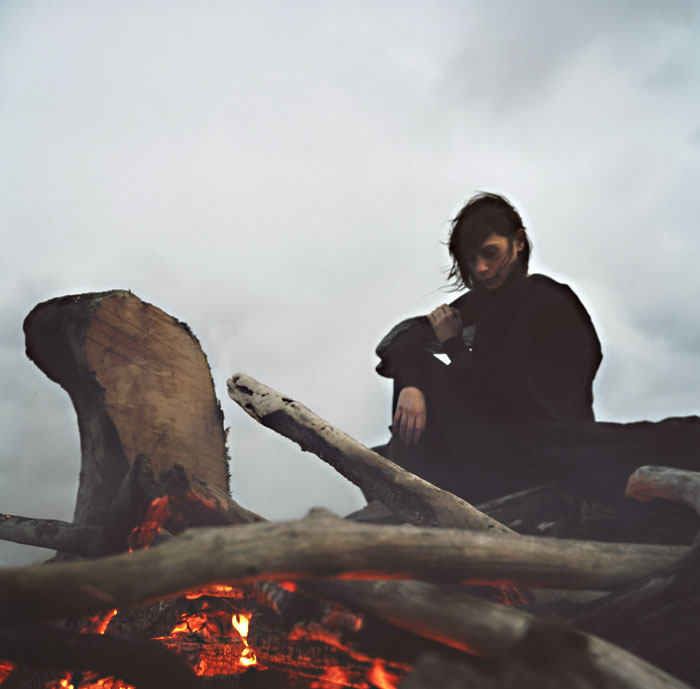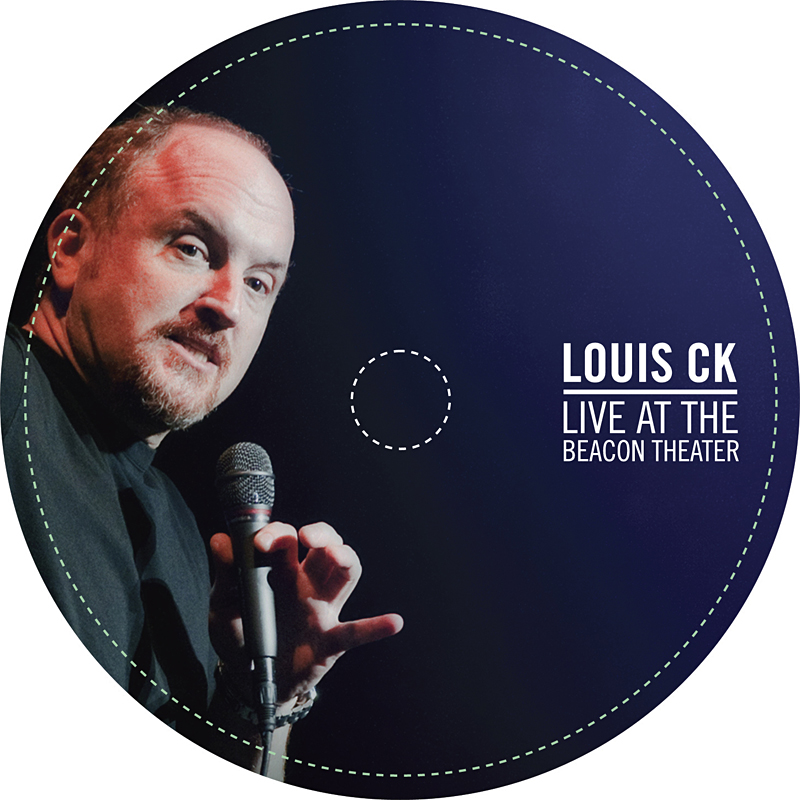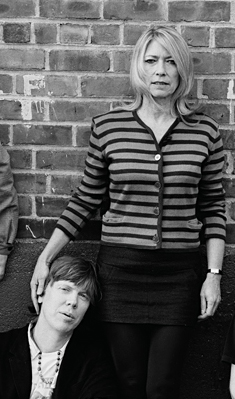Jesy Fortino writes dark, contemplative songs that require serious focus from a listener. Actually, these songs (which she records under the moniker Tiny Vipers) don’t require focus so much as they slowly entangle the listener like tentacles, pulling you in tight ’til you’re left with no choice but to pay close attention. However, the trick to being transfixed by her music is to let go mentally and be open to said transfixion—otherwise you’ll never understand what makes her music so compelling.
In 2007, Seattle’s indie monolith Sub Pop released the first album of Fortino’s songs, called Hands Across the Void. Because of the label’s high profile, she was subsequently booked to play opening gigs in front of audiences who had no interest in allowing themselves to be hypnotized by her patient plucking and slithery voice. (The awkward shows, she stresses, were not Sub Pop’s fault, but rather that of a booking agent only interested in working with her because she was on the legendary label.)
“I think I made it [through] two songs at the Showbox before people started chanting ‘Minus the Bear,'” Fortino says of one particularly miserable show. “I couldn’t even hear myself on the monitors.”
So she walked offstage, an act she attributes to hard-won maturity.
Though giving up is rarely considered mature, the 26-year-old Issaquah native says her decision to abort the set wasn’t her way of pouting (though she admits to doing some of that, as well). Rather, it had more to do with accepting the fact that not everyone would listen to—let alone enjoy—her music. When I suggest that her realization was “very Zen,” she says: “Well, forced Zen, really.”
Like a lot of female singer-songwriters, Fortino is shy and would prefer to sit quietly in a corner than take command of a room. On record, she has the ability to draw listeners in, as if her songs contained the hypnotic glow of a campfire. But following the release of Void, many of her live performances were like lighting a pretty votive candle in the middle of a fraternity kegger: It glowed brightly…but inevitably some drunk would stumble, spill his beer, and put out the flame. Fortino found it hard to blame her music, so initially she blamed the audience. But at some point—after two awkward stints opening for Jose Gonzalez and the aforementioned Minus the Bear—she realized that her music was simply not built for the masses. She would be much happier playing in venues that suited her songs (a place, she says, like the Triple Door or Fremont Abbey). So last fall, she went on a European tour with Damien Jurado, an equally subtle performer whose audiences expect to hear softly sung folk music. For Fortino, the tour was an eye-opener, and it informed the approach she took on her latest release, Life on Earth.
Fortino calls herself Tiny Vipers, but it’s not an alter ego in the Will Oldham/Bonnie ‘Prince’ Billy sense. It’s more akin to Red House Painters or Iron & Wine—a slice of poetic imagery evocative of the music she makes. Thus her music as Tiny Vipers is moody, emotional, eerie, fragile, and, like a snake, in no hurry whatsoever.
“I think the problem with the first record was that I had too many expectations,” she says over lunch at Capitol Hill’s Petit Rosso Cafe. “Just being too quiet for almost every venue I played, I was like ‘OK, this sucks.’ And, y’know, I had to learn the difference between the commercial world and the music world. You have to pick a side or you’re gonna go crazy. I’d rather work with people I’m buddies with, and play shows with friends, and have my booking agent be my friend, and not people who are working with me just because I’m on Sub Pop, or whatever.”
With that in mind, when it came time to record Life on Earth, her sophomore album, she called her friend, Austin-based producer Andrew Hernandez, whom she met while contributing guest vocals to an album by the group Balmorhea (also Austin-based). As Fortino explains, no one had ever asked her to sing on an album that was not her own, so she was nervous, understandably.
“I was, like, ‘OK, I’m gonna try to be calm about this,'” she says of her studio jitters. “But there were all these people standing around the studio watching. So I asked [Hernandez] ‘Can I just be alone?’ And he was, like, ‘Yeah, totally, whatever you want.’ So when it came time to record the new record, I thought, ‘Man, that recording engineer [Hernandez] was so cool…everything just clicked.”
Like its predecessor, Life on Earth is rooted in spaciousness and solitude. Each song, thanks in no small part to Hernandez, is given free rein to spread out and exhale. But where Void had a campfire-like intimacy, Earth is the sound of one woman, alone in a room, surrounded by nothingness. This concept may sound bleak, but as those who have spent hours in deep meditation can attest, it’s only through solitude that we achieve clarity of mind. Thus, Fortino gives us a bounty of lyrics that read like Han Shan’s hermetic Zen poetry: “Life’s not lived right/When you’ve only got someplace to go” (“Slow Motion”); “Tomorrow is only dying” (“Life on Earth”); “The secret to a language/That is spoken from the soul/Is silence (“Tiger Mountain”).
“These songs are songs,” she says. “With every one of them, I would finish writing them and be, like, ‘This song is done. There’s nothing more I can do.’ It felt good.”
For this newfound tunefulness, Fortino cites Townes Van Zandt as an inspiration. As she says, the legendary Texas songwriter could be abstract and plainspoken all at once. And like Van Zandt, Fortino has written songs for Life on Earth that will stick in your head and haunt you in the middle of the day…if you let them, that is.








